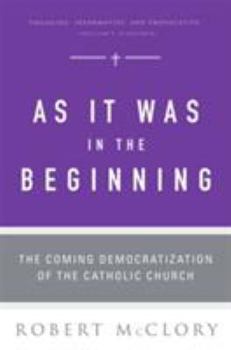As It Was in the Beginning: The Coming Democratization of the Catholic Church
Select Format
Select Condition 
Book Overview
Many assume the Catholic Church has always functioned with a top-down leadership model. But in this well-researched book, Robert McClory reveals that there have been long periods where lay people were consulted and had strong, leading voices. McClory also explains that a decentralized Chruch is around the corner and is inevitable. The books helps readers read the signs of the times to identify what is to come for the world's longest running corporation...
Format:Paperback
Language:English
ISBN:0824524195
ISBN13:9780824524197
Release Date:October 2007
Publisher:Crossroad Publishing
Length:240 Pages
Weight:0.60 lbs.
Dimensions:0.6" x 5.6" x 8.2"
Customer Reviews
3 ratings
Opened my eyes
Published by Thriftbooks.com User , 16 years ago
I am in my mid-twenties, was raised in the Catholic Church, but in the last few years I have found it lacking. As I have learned more about the history of the Church, it has become an institution laden with a thousand years of ingrained behavior that will never change, and won't face the reality of today. The priest scandal has just made me want to forget about the Church altogether. But I never knew about the democratic upheavals at Nicea or Constance, nor of the grass-roots followup to Vatican II that is sweeping our country. Reading this has made me proud to be a Catholic again, and it gives me hope that in my lifetime, I may see it throw off its worst habits, and revitalize like I never imagined. Mr. McClory opened my eyes to the idea that the Church, despite its massive hierarchy, has underpinnings of democracy. He presents a carefully researched work that shows how democracy has permeated the Church since the early days, and even right in the midst of the feudal system. The history of the Church is not one of constant patriarchal power; instead it is a long friction between the laity and the clergy. His ultimate conclusion - that full democratization may be right around the corner - is difficult to believe. But his faith in the way of the Holy Spirit to revitalize the Church is too strong to dismiss, and even in the face of unlikeliness and long odds, he makes a convincing argument that change is on the horizon. What you read here, they don't teach in Sunday school. I'd say this is required reading for Catholics.
He's Got It Right!
Published by Thriftbooks.com User , 16 years ago
He's Got It Right! Mr. McClory has given us a clear understanding of the laity's role in church decision making. His research into the historically democratic backed church exposes today's hierarchical hi-jacking of the role of who/what the church is. He has used personal reminiscences of reading Dostoevski's 'The Brothers Karamazov' while in the seminary and using the role of the Grand Inquisitor to explain what our hierarchy has done, i.e., maintained the power to control the laity and taken away their freedom to participate in decision-making. These are decisions, such as, communities of laity and priests in selecting bishops, a deeper role of women in the church (why not priesthood?), married along with celibate priests (since we do accept married Episcopalian priests fleeing women priests in their church), etc. This all blends well with Mr. McClory's personal journey and his taking us through history showing us the many examples of democratic bottoms-up changes that have been part of the church since its founding. Finally, this insightful and lucid rendering of the predicament answers the simmering question of what or who the Church is - that we in the pews are the church. As eloquently stated at the beginning, by Cyprian, the bishop of Carthage in North Africa from 248 to 258, ... that "the full church, especially, the laity, are to have a voice and choice in the major decisions of his diocese." (p.41-2) This leads to the question of whether there is need for a medieval monarchical structure reigning over the church. The vassals of long ago kings are no longer here. An educated wiser and dedicated laity is the reality of today's church. It is important for the Catholic laity to read this book and see their heritage in this historical insight. Perhaps then we will all gain a new perspective of our rightful role in today's church. Yes, he's got it right!
McClory's Loving Critique
Published by Thriftbooks.com User , 16 years ago
McClory's life in the church has equipped him with a knowledge of how it works, and his love of justice leads him to critique these inner workings. The most prominent feature of this latest book of his is the love he obviously bears for his native place, the Church. (A preview of this attitude appeared in his earlier book, Faithful Dissenters: Stories of Men and Women Who Loved and Changed the Church.) His scholarly review of the history of the issue of the role of the laity and its influence on the polity of the church is lucid, concise and persuasive. The idea of the dominance of the "higher end" of the Church's hierarchy is relatively new, and it sometimes appears that members of that hierarchy have forgotten that they are the servants of those in the pews, and do what they do in their name as well as that of the Almighty. It was Jesus, after all, who taught that, in God's Kingdom, those who would be first must be last, that he or she who would be great must be the servant of all. McClory speaks out of a mature vision with a clear voice of reason; this book is a "must read" for anyone who has questions about how the governance of the Church can change to reflect properly the will of its people as it moves forward into its third millennium.




